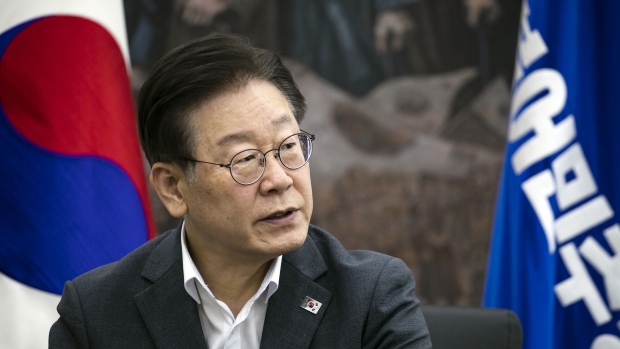Sep 26, 2023
South Korean Court Rejects Arrest Warrant for Opposition Leader
, Bloomberg News

(Bloomberg) -- A South Korean court rejected an arrest warrant for the leader of the main political opposition party on graft charges, a move that could embolden the political heavyweight before a national election in April.
The Seoul District Court ruled after a hearing on Tuesday that Democratic Party leader Lee Jae-myung should not be arrested. Lee, who a few days before the hearing ended a hunger strike that landed him in the hospital, entered court with the aid of a walking stick. He has denied any wrongdoing.
His appearance marked the first time a South Korean opposition leader has faced a court hearing for an arrest warrant, the Yonhap News Agency said.
Lee was the party’s nominee for the presidential election in 2022, and prosecutors are seeking to arrest him on corruption charges. Some Democratic Party members are concerned Lee has become a liability and may not be able to focus his attention on the election, where his group is facing a challenge from President Yoon Suk Yeol’s conservative party, which is battling to regain a majority in parliament.
Sitting lawmakers cannot face arrest during a session unless the body approves a measure. Several members of Lee’s party broke ranks and voted last week to allow the warrant to go forward. Of the 295 votes cast, 149 approved the measure in the anonymous vote. Lee’s party has 168 seats in the 300-seat National Assembly, while Yoon’s People Power Party holds 111.
The decision to deny the arrest warrant is likely to energize Lee’s backers in his party, who have been saying he is a victim of a political witch hunt by conservative forces.
Lee was indicted in March on charges including breach of duty and bribery. In August, prosecutors charged him with third-party bribery in connection with a company that allegedly transferred about $3 million illegally to North Korea to facilitate a possible visit to Pyongyang by Lee, Yonhap and other media outlets reported.
If Yoon’s People Power Party takes control of parliament, it is likely to push through economic policies that include taking on powerful labor unions, reducing regulations on businesses, and tax cuts for companies and on real estate transactions.
Lee has said his opponents are using the charges as political leverage. While Lee has a fervent base of support in the progressive camp, a Gallup Korea poll a few months ago showed 60% disapproved of Lee’s role as leader of the Democratic Party while 32% approved.
--With assistance from Shinhye Kang and Sangmi Cha.
©2023 Bloomberg L.P.







